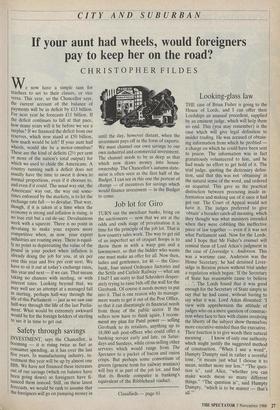Looking-glass law
THE case of Brian Fisher is going to the House of Lords, and I can offer their Lordships an unusual precedent, supplied by an eminent judge, which will help them no end. This (you may remember) is the case which will give legal definition to insider trading. He was accused of obtain- ing information from which he profited a charge on which he could have been sent to prison. The information was in fact gratuitously volunteered to him, and he had made no effort to get hold of it. The trial judge, quoting the dictionary defini- tion, said that this was not 'obtaining' in the natural sense of the word, and ordered an acquittal. This gave us the practical distinction between procuring inside in- formation and making use of it once it had got out. The Court of Appeal would not have it. The judges preferred to give `obtain' a broader catch-all meaning, which they thought was what ministers intended when they were cobbling this ineffective piece of law together — even if it was not what Parliament said. Now for the Lords, and I hope that Mr Fisher's counsel will remind them of Lord Atkin's judgment in the case of Liversidge v. Anderson. This was a wartime case, Anderson was the Home Secretary, he had detained Live r- sidge in Brixton prison without trial under a regulation which began: 'If the Secretary of State has reasonable cause to believe . . .'. The Lords found that it was good enough for the Secretary of State simply to say that he had cause, without having to say what it was. Lord Atkin dissented: 'I view with apprehension the attitude of judges who on a mere question of construc- tion when face to face with claims involving the liberty of the subject show themselves more executive-minded than the executive. Their function is to give words their natural meaning . . . I know of only one authority which might justify the suggested method of construction. "When I use a word", Humpty Dumpty said in rather a scornful tone, "it means just what I choose it to mean, neither more nor less." "The ques- tion is", said Alice, "whether you can make words mean so many different things." "The question is", said Humpty Dumpty, "which is to be master — that's all."'


































































 Previous page
Previous page